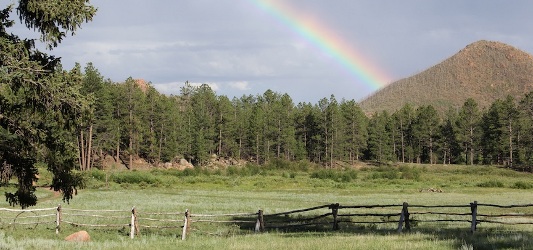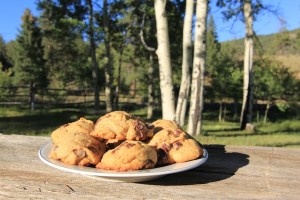My Grandfather’s Blessing

A Good Morning
With the close of last week I completed two months working part time as a ranch hand on the isolated, Buffalo Peak Ranch in the Front Range of Colorado. Each morning the sun rises and I am stirred by its heat, the light falling across my face through the open doors of the second story of the barn where I sleep. I stretch, my eyes work to open.
The sky yet retains the depth of colour of the night sky, mixed with the rising sun. The coyotes howl and the most curious of the humming birds, who have come to know me fairly well, hovers directly in front of me, darting from my left eye to my right and back to the left again before departing with a chirp and a buzz. It is as though she is reminding me to come feed her.
I sit up, stretch, and engage in a few minutes of yoga and meditation to return my heart to a near sleeping state. I work to clear my mind of the anxiety of the final waking moments of sleep when it seems all that lays ahead of me finds form as characters in a dream.
It is not easy, but I want to rise in control of my body, aware of every motion and every breath. I envision email from anticipated sources, mentally run through my calendar of due-dates and deadlines and wonder if I forgot something the night before. I work to quickly sweep these thoughts aside as I realize I am again not living in the moment, the sunrise worth every bit of my attention.
I rise to my feet, arms outstretched, grasping both of the barn doors in order to draw them closed. If I were to stumble I could fall back onto my bed or forward and drop twelve feet to the packed earth below. I like the fact that my head rests near a ledge all night. It reminds me of so many nights sleeping in the desert. It feels grounded, real.
I pull on my shorts and shoes, walk across the plywood floor of the hay barn, down the stairs covered in white bird droppings, and across the yard to the cabin. The moment I open the door, even as I remain outside, a half dozen humming birds fly around me. Some are so close I can feel the movement of air from their wings across my forehead and cheeks.
They know me now. The sound of the door signifies to them the coming of fresh sugar water. A few days ago four of these amazing creatures sat still, wings folded, two on each of my hands. I was able to move my hands forward and back while they kept their beaks engaged in the drinking ports. Eventually, I hope to gain their trust such that I can pet them, but that would take more time than I have committed to building our symbiotic relationship. They receive water and in exchange, I am given reason to smile.
Once inside, I prepare cold cereal or yogurt and granola, a glass of juice or cold, homemade ginger tea. It’s almost a routine, but not quite, for each day there is something unique. Sometimes a few rabbits scurry across the yard. Once or twice, the elk run by, between thirty and forty in the herd.
With a Shovel in Hand
This summer I helped Trevor, the head ranch hand, repair the culvert gate for the upper pond, dig nearly one thousand feet of trench with a rented Ditch Witch and then drop-in a two inch line to drain the bogs into two 275 gallon tanks for the cattle. We hope this will reduce their time in the stream, their hooves eroding the banks and waste polluting the water.
Our ad hoc surveying equipment (a carpenters level balanced across two shovels topped by a camera with zoom lens sighted to a tape measure at nearly 200 feet distance) proved useful as the water flowed through the pipe the first time.
In the final week of July, we co-designed and built a form, mixed thirty six bags of concrete, and constructed a gated dam to restore the third pond just above the road. Every day we worked hard, completing valuable projects which improve the function and value of the property.
We seldom came in from the pasture until the sun was behind the peak—but then the day was done. That sense of accomplishment reminds me of growing up on our family farm in Iowa. There was nothing else to do once the sun was set, a sense of both living in the moment and letting go until the next day. We accomplished all that was possible. It will be there tomorrow, waiting.
Those were the days before cell phones and the Internet, when the land line phone rang once a day and the most important people in the world were right there, in front of you, sharing stories.
Make Time for the Storm
A thunderstorm swept across the ranch today. At two in the afternoon, the sky grew dark as it would at dusk, the temperature dropped, and the hummingbirds retreated to where it is they go for shelter, the back door quiet without their fighting over what would surely cause diabetes in humans.
The first drops fell and I remained here, at my keyboard. The thunder shook the cabin and the window to my front lit up. It was only then when I realized I was missing the storm outside. Suddenly the ozone was present, cool moisture entering the cabin. I moved quickly to watch the best show on Earth.
Outside, I welcomed the rain as my hair, shirt, and pants grew wet. The cattle in the distant pasture moved from open grass to the cover of trees and behind me, another lightning bolt struck in the Lost Creek Wilderness.
Just as my body began to shiver the rain let up and the lightning ceased. I walked around the cabin to the hot tub, lifted the cover, removed my wet clothes, and stepped in.
Finally, I was there, in just one place and one time.
If only I could live that way, every hour of ever day, as I did those many summers on my family farm. That would be my grandfather’s blessing, a reminder of the value of doing just one thing at a time.





